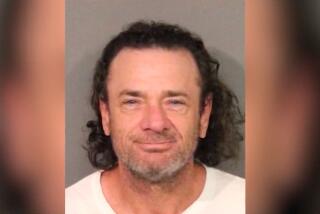County’s Oldest Defendant Goes on Trial in Slaying
- Share via
In a matter-of-fact voice tinged with a Texas drawl, 91-year-old Alfred Pohlmeier told authorities why he strangled his ailing wife.
“She’d get these hacking spells, she’d hack and hack and hack,” he told authorities in an interview taped shortly after the 1995 killing.
“I just about went nuts,” Pohlmeier explained. “I just decided I was going to strangle her and that was it.”
Nearly 17 months after Lidwina Pohlmeier’s death, portions of the taped interview with police were played for a jury Monday during opening statements in the long-awaited murder trial.
Now 93, the retired Fillmore postal worker is the oldest felony defendant to ever stand trial in Ventura County. Prosecutors are seeking a first-degree murder conviction.
“Alfred Pohlmeier strangled his wife, Lidwina, his wife of 62 years, with his bare hands,” Deputy Dist. Atty. Donald C. Glynn told jurors, showing the 12-member panel photographs of the elderly woman’s bruised throat. According to Glynn, Pohlmeier got fed up with the coughing, put his hands on his 86-year-old wife’s neck and choked her for more than five minutes until she stopped moving. He then called 911.
Although paramedics were able to start her breathing again, she was comatose, and died two hours later after being taken off a respirator at Santa Paula Hospital.
Glynn told the jury that in the weeks before Lidwina Pohlmeier’s death, three doctors found no evidence of a virus or irritant that caused her to cough.
“She did not have some debilitating illness,” Glynn said. “She did not want to die.”
Deputy Public Defender Susan Olson did not dispute that her client strangled his wife on the morning of Sept. 13, 1995, in their Fillmore home. But she asked the jury to consider Pohlmeier’s state of mind.
“At that moment, in his hopelessness and desperation, he reached over and choked her,” Olson said, explaining that he was exhausted from lack of sleep because of his wife’s constant coughing, and under stress because of her failing health.
“This was not a murder,” she said. “This was a misguided act of love.”
As she spoke, one of Pohlmeier’s sons wept quietly in the back of the courtroom. Although Pohlmeier has entered a plea of not guilty by reason of insanity, his mental state only becomes an issue if he is convicted in the trial, which is expected to last several weeks.
If he is found guilty, a second phase must be held to deal solely with the question of sanity, Superior Court Judge Allan L. Steele said.
Olson told the jury Monday that several witnesses, including a few of Pohlmeier’s five adult children and neighbors, will testify about his love and devotion to his wife.
Lidwina Pohlmeier’s doctors and visiting nurses also are expected to take the witness stand to talk about her various health problems and how her primary care-giver--Alfred Pohlmeier--dealt with them.
“They will all testify that Mr. Pohlmeier was devoted to Lidwina,” Olson said.
Glynn told the jury in his earlier statements that Pohlmeier’s popularity and demeanor should not overshadow his act.
“They will tell you he is a nice guy,” Glynn said. “But what he did was wrong.”
During the opening statements, Pohlmeier sat slouched in a wheelchair, a gray suit hanging loosely on his thin frame, and listened through a hearing aid.
Although his trial was initially set to begin in February 1996, the case was delayed a year after Pohlmeier fell ill and attorneys on both sides encountered scheduling conflicts.
In December 1995, Pohlmeier’s jailers took him to the hospital for brain surgery after he fell in his cell and seriously injured his head. After six days in the hospital, he was taken back to the County Jail.
Olson argued at court hearings that her client was too old and sick to be housed in the jail.
Jail officials admitted that they are not used to caring for the elderly. They have had to hire nurses to care for Pohlmeier, who is housed in the jail’s medical ward.
More to Read
Sign up for Essential California
The most important California stories and recommendations in your inbox every morning.
You may occasionally receive promotional content from the Los Angeles Times.












